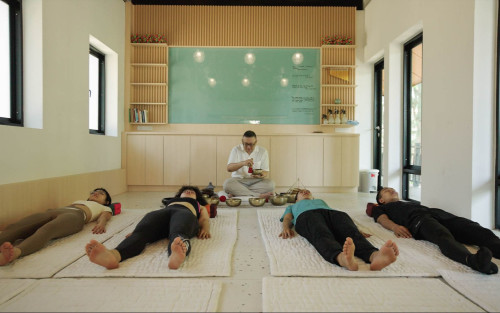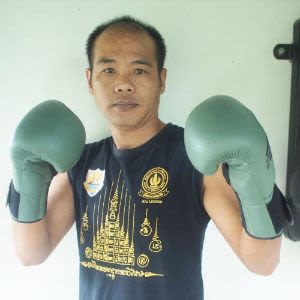








Treehouse Thailand
Verified Center
This provider's information has been quality-checked by Recovery.com's Research Team for accuracy and completeness, including center verification through appropriate third-party organizations.
Treatment Focus
This center treats substance use disorders and mental health conditions. You'll receive individualized care catered to your unique situation and diagnosis, learn practical skills for recovery, and make new connections in a restorative environment.
Primary Level of Care
Offering intensive care with 24/7 monitoring, residential treatment is typically 30 days and can cover multiple levels of care. Length can range from 14 to 90 days typically.
Treatment Focus
This center treats substance use disorders and mental health conditions. You'll receive individualized care catered to your unique situation and diagnosis, learn practical skills for recovery, and make new connections in a restorative environment.
Primary Level of Care
Offering intensive care with 24/7 monitoring, residential treatment is typically 30 days and can cover multiple levels of care. Length can range from 14 to 90 days typically.
Private Pay
You pay directly for treatment out of pocket. This approach can offer enhanced privacy and flexibility, without involving insurance. Exact costs vary based on program and length of stay. Contact the center for specific details.
Treehouse Thailand
Treehouse Thailand
About Treehouse Thailand
Treehouse Thailand is a luxury rehab centre dedicated to helping individuals achieve transformational healing that lasts. Their rehab centre was created to address a lack of medication-free, holistic, and personalised rehab treatments in Asia. Treehouse Thailand combines the latest technologies, traditional healing practices, tailor-made fitness programs and research-backed therapies in each personalised treatment plan. Working with only 8 clients at any one time, their unique methodology can help clients recover long-term from mental health conditions, substance addictions, and behavioral addictions. In addition to their original location, Treehouse Thailand also operates a second facility in Chiang Mai, offering the same care amidst the beauty of Northern Thailand.
Highly Personalised And Comprehensive
Treehouse Thailand begins their bespoke rehab services with a complementary brain mapping session. Their neurofeedback specialist uses the findings to see how a client’s brain functions may correlate with mental health conditions. With this information, their therapists create customized treatment plans and identify therapies for each client. Treehouse Thailand’s staff includes psychologists, psychiatrists, licensed therapists, counsellors, holistic practitioners, and compassionate support staff. If needed, they guide clients through a safe and comfortable detox.
Engaging Adventure Outings
Treehouse Thailand’s commitment to a holistic and enriching experience connects clients to weekly adventure therapies, including:
•Elephant sanctuary visits
•River kayaking
•Thai cooking classes
•Ziplining
•Night safaris
•ATV tours
They design their weekly excursions to reignite each client’s passion for living and help them find a sense of community with peers. Adventure therapy takes place each Thursday from 9am-6pm.
Modern Facilities And Evidence-Based Care
Treehouse Thailand has 8 luxurious Thai-style private log cabins situated along the banks of the Ping River, with one cabin for each client. Clients can enjoy personal training, art and music therapy, cognitive and dialectical behavioral therapies (CBT, DBT), eye movement desensitization and reprocessing (EMDR), and osteopathy therapy, among others. All clients who complete at least 4 weeks of primary treatment receive 4 weekly, psychologist-led online therapy sessions as part of their followup treatment. Each weekly session lasts about an hour. Clients can also sign up for nominally-priced individual counseling sessions as an alumnus.
Highlights from the Center
Highlights
These highlights are provided by and paid for by the center.
Therapeutic Location
Holistic Approach
Neuro/Bio Feedback Therapy
Trauma Treatment
Center Overview
Treatment Focus
This center treats substance use disorders and mental health conditions. You'll receive individualized care catered to your unique situation and diagnosis, learn practical skills for recovery, and make new connections in a restorative environment.

Treehouse Thailand
Pricing and Program Length
Estimated Center Costs
The cost listed here (From $9,000 USD / 28 days), is an estimate of program cost. Center price can vary based on program and length of stay. Contact the center for more information. Recovery.com strives for price transparency so you can make an informed decision.




Recovery.com Verified Listing
Recovery.com verified that the name, location, contact information and license to operate for this treatment provider are valid and up-to-date.

Licensed by Thailand
Recovery.com is an independent, third-party mental health resource. Verification does not imply endorsement and does not guarantee the quality of treatment services.
Meet Your Care Team

John Logan
Clinical Manager
BSoc (Counselling), Psychotherapist

Dr. Nongnuch (Dr. Pui)
Psychiatrist
MD Diploma of Thai Board of Psychiatry

Saurav
Psychologist, CBT Specialist, Mindfulness Specialist, 500 Hours Yoga Teacher
MA Counselling Psychology

Khun Gigi
Clinical Psychologist
B.S Psychology

Gabriel Rodriguez
Psychologist
Master of Science in Psychology - Addictions

Khun Note
Psychologist
BEd Counselling Psychology

Conan Law
Psychologist
MSc Psychology

Eve
Deputy Clinical Manager
MA ( Counselling & Art Therapy)

Rucha
Nurse
BNurseSc

Emmy
Night Manager
BNurseSc

Molly
Operations Manager

Paeng
Support Worker

Yanmin
Support Worker

Adriel
Mindfulness Coach, Meditation Guide, Yoga Teacher Trainer
E-RYT-500, MSBR, YACEP, BCom, LL.B, GDLLP

Tara
Certified Yoga Teacher
Yoga Nidra Practitioner

Nattapol Chaiwul
Fitness Manager
Muay Thai Class C License

Naing
Personal Trainer

Abigail Phua
Admission Manager (Asia Pacific)

Arthur Phua
Clinical Advisor
MSS (Counselling)

Dr. Nongnuch
Clinical Advisor
Registered Clinical Psychiatrist

Chris Sekar
Registered Clinical Supervisor (Malaysia)
MA Counselling (UK), Graduate-Diploma Counselling Psychology (UK)

Santiago Brand Ortiz
Neurofeedback & Biofeedback Director
BCN, BCB, HRV, QEEGD, Clinical Director Mindlab Neuroscience Consulting Singapore
Your Care Options
Specializations
Alcohol
Using alcohol as a coping mechanism, or drinking excessively throughout the week, signals an alcohol use disorder.
Anxiety
Anxiety is a common mental health condition that can include excessive worry, panic attacks, physical tension, and increased blood pressure.
Burnout
Burnout entails mental and physical exhaustion, and leads to a severe lack of fulfillment. This condition is often caused by overwork.
Depression
Symptoms of depression may include fatigue, a sense of numbness, and loss of interest in activities. This condition can range from mild to severe.
Drug Addiction
Drug addiction is the excessive and repetitive use of substances, despite harmful consequences to a person's life, health, and relationships.
Gambling
Excessive, repetitive gambling causes financial and interpersonal problems. This addiction can interfere with work, friendships, and familial relationships.
Trauma
Some traumatic events are so disturbing that they cause long-term mental health problems. Those ongoing issues can also be referred to as "trauma."
Neurofeedback
During therapy, patients observe their own brain waves as interpreted by an EEG. This empowers them to understand and regulate emotional responses.
Who We Treat
Adolescents
Teens receive the treatment they need for mental health disorders and addiction, with the added support of educational and vocational services.
Young Adults
Emerging adults ages 18-25 receive treatment catered to the unique challenges of early adulthood, like college, risky behaviors, and vocational struggles.
LGBTQ+
Addiction and mental illnesses in the LGBTQ+ community must be treated with an affirming, safe, and relevant approach, which many centers provide.
Men and Women
Men and women attend treatment for addiction in a co-ed setting, going to therapy groups together to share experiences, struggles, and successes.
Midlife Adults
For adults ages 40+, treatment shifts to focus on the unique challenges, blocks, and risk factors of their age group, and unites peers in a similar community.
Professionals
Busy, high-ranking professionals get the personalized treatment they need with greater accommodations for work, privacy, and outside communication.
Treatment Services
Detox (on-site with residential)
This is often the first step of addiction treatment. For many people, it's dangerous to detox without proper medical support.
Licensed Primary Mental Health
Some primary care providers offer mental health diagnosis and treatment. This can prevent patients from developing more serious conditions.
Residential
In a residential rehab program, patients live onsite, with access to daily treatment and 24-hour care. An average stay is 30-90 days.
Retreat
These curated experiences promote physical, mental, and spiritual well-being, and provide a break from the busy pace of daily life.
Approaches
Evidence-Based
A combination of scientifically rooted therapies and treatments make up evidence-based care, defined by their measured and proven results.
Holistic
A non-medicinal, wellness-focused approach that aims to align the mind, body, and spirit for deep and lasting healing.
Individual Treatment
Individual care meets the needs of each patient, using personalized treatment to provide them the most relevant care and greatest chance of success.
Non 12 Step
Non-12-Step philosophies veer from the spiritual focus of the 12-Steps and instead treat the disease of addiction with holistic or secular modalities.
Therapies
1-on-1 Counseling
Patient and therapist meet 1-on-1 to work through difficult emotions and behavioral challenges in a personal, private setting.
Meditation & Mindfulness
A practiced state of mind that brings patients to the present. It allows them to become fully aware of themselves, their feelings, and the present moment.
Trauma-Specific Therapy
This form of talk therapy addresses any childhood trauma at the root of a patient's current diagnosis.
Mindfulness Therapy
This ancient practice can be mental, emotional, and even spiritual. In meditation, you focus your attention on the present moment without judgement.
Adventure Therapy
This experiential approach uses the physical and emotional challenges of outdoor activities as tools for personal growth.
Attachment-Based Family Therapy
ABFT is a trauma-focused therapy that teaches you to form healthy relationships by rebuilding trust and healing attachment issues formed in childhood.
Conditions We Treat
Pornography Addiction
A person with a porn addiction is emotionally dependent on pornography to the point that it interferes with their daily life and relationships.
Schizophrenia
Schizophrenia is a serious mental health condition that causes hallucinations, delusions, and disordered thinking.
Grief and Loss
Grief is a natural reaction to loss, but severe grief can interfere with your ability to function. You can get treatment for this condition.
Personality Disorders
Personality disorders destabilize the way a person thinks, feels, and behaves. If untreated, they can undermine relationships and lead to severe distress.
ADHD, ADD
ADHD is a common mental health condition caused by dopamine imbalance. Common symptoms include inattention, hyperactivitiy, and impulsivity.
Anger
Although anger itself isn't a disorder, it can get out of hand. If this feeling interferes with your relationships and daily functioning, treatment can help.
Anxiety
Anxiety is a common mental health condition that can include excessive worry, panic attacks, physical tension, and increased blood pressure.
Bipolar
This mental health condition is characterized by extreme mood swings between depression, mania, and remission.
Burnout
Burnout entails mental and physical exhaustion, and leads to a severe lack of fulfillment. This condition is often caused by overwork.
Substances We Treat
Alcohol
Using alcohol as a coping mechanism, or drinking excessively throughout the week, signals an alcohol use disorder.
Chronic Relapse
Consistent relapse occurs repeatedly, after partial recovery from addiction. This condition requires long-term treatment.
Co-Occurring Disorders
A person with multiple mental health diagnoses, such as addiction and depression, has co-occurring disorders also called dual diagnosis.
Cocaine
Cocaine is a stimulant with euphoric effects. Agitation, muscle ticks, psychosis, and heart issues are common symptoms of cocaine abuse.
Drug Addiction
Drug addiction is the excessive and repetitive use of substances, despite harmful consequences to a person's life, health, and relationships.
Ecstasy
Ecstasy is a stimulant that causes intense euphoria and heightened awareness. Abuse of this drug can trigger depression, insomnia, and memory problems.
Heroin
Heroin is a highly addictive and illegal opioid. It can cause insomnia, collapsed veins, heart issues, and additional mental health issues.
Psychedelics
Hallucinogenic drugs—like LSD—cause euphoria and increased sensory experiences. When abused, they can lead to depression and psychosis.
Languages
Aftercare
Care Designed for Your Needs
Personal Amenities
Amenities
Special Considerations
Center Pets
Addiction and mental health facilities with pets allow patients to interact with friendly dogs, cats, horses, and in some cases, even dolphins.
Couples program
Using gentle clinical care, therapists guide patients and their partner through guided sessions to address issues and work towards lasting solutions.
Family Member Stays
Treatment providers welcome family members to stay on-site to better the experience and success of patients and their families as a whole.
Flexible technology policies
Centers with flexible technology policies allow professionals to stay in touch with work and give patients a greater sense of connection and normalcy.
Activities
Yoga
Yoga is both a physical and spiritual practice. It includes a flow of movement, breathing techniques, and meditation.
Off-Site Activities
Off-Site Amenities
Learn More About the Center
Programme Schedule Example
See an overview of a typical week at Treehouse Thailand.
Admissions Process at Treehouse Thailand
Learn more about the simple admissions process and additional travel requirements.
Why Choose Treehouse Thailand?
Find out what makes Treehouse Thailand a unique place to find recovery.
Common Questions for Treehouse Thailand
Read answers to common questions about stay times, aftercare, and more.
What people are saying
Treatment
5.0
Accommodations
4.8
Food & Nutrition
4.7
Value
4.7
Pros
- Addressed Trauma (5)
- Beautiful Location (5)
- Excellent & Effective Treatment Programming (5)
- Personalized (5)
Chris
Treatment in 2024 • (30 days) • Reviewed 03/07/24
Former Client
•Australia
Sara
Treatment in 2023 • (60 days) • Reviewed 06/21/24
Loved One of a Former Client
Peter Blunt
Treatment in 2023 • (30 days) • Reviewed 09/28/23
Former Client
Lisa
Treatment in 2023 • (45 days) • Reviewed 09/24/23
Former Client
JJ
Treatment in 2024 • (30 days) • Reviewed 03/06/24
Former Client
•Manager





